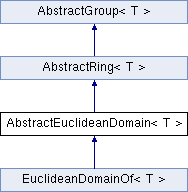Abstract Euclidean domain. More...
 Inheritance diagram for AbstractEuclideanDomain< T >:
Inheritance diagram for AbstractEuclideanDomain< T >:Public Types | |
| typedef T | Element |
 Public Types inherited from AbstractRing< T > Public Types inherited from AbstractRing< T > | |
| typedef T | Element |
 Public Types inherited from AbstractGroup< T > Public Types inherited from AbstractGroup< T > | |
| typedef T | Element |
Public Member Functions | |
| virtual void | DivisionAlgorithm (Element &r, Element &q, const Element &a, const Element &d) const =0 |
| Performs the division algorithm on two elements in the ring. More... | |
| virtual const Element & | Mod (const Element &a, const Element &b) const =0 |
| Performs a modular reduction in the ring. More... | |
| virtual const Element & | Gcd (const Element &a, const Element &b) const |
| Calculates the greatest common denominator in the ring. More... | |
 Public Member Functions inherited from AbstractRing< T > Public Member Functions inherited from AbstractRing< T > | |
| AbstractRing () | |
| Construct an AbstractRing. | |
| AbstractRing (const AbstractRing &source) | |
| Copy construct an AbstractRing. More... | |
| AbstractRing & | operator= (const AbstractRing &source) |
| Assign an AbstractRing. More... | |
| virtual bool | IsUnit (const Element &a) const =0 |
| Determines whether an element is a unit in the group. More... | |
| virtual const Element & | MultiplicativeIdentity () const =0 |
| Retrieves the multiplicative identity. More... | |
| virtual const Element & | Multiply (const Element &a, const Element &b) const =0 |
| Multiplies elements in the group. More... | |
| virtual const Element & | MultiplicativeInverse (const Element &a) const =0 |
| Calculate the multiplicative inverse of an element in the group. More... | |
| virtual const Element & | Square (const Element &a) const |
| Square an element in the group. More... | |
| virtual const Element & | Divide (const Element &a, const Element &b) const |
| Divides elements in the group. More... | |
| virtual Element | Exponentiate (const Element &a, const Integer &e) const |
| Raises a base to an exponent in the group. More... | |
| virtual Element | CascadeExponentiate (const Element &x, const Integer &e1, const Element &y, const Integer &e2) const |
| TODO. More... | |
| virtual void | SimultaneousExponentiate (Element *results, const Element &base, const Integer *exponents, unsigned int exponentsCount) const |
| Exponentiates a base to multiple exponents in the Ring. More... | |
| virtual const AbstractGroup< T > & | MultiplicativeGroup () const |
| Retrieves the multiplicative group. More... | |
 Public Member Functions inherited from AbstractGroup< T > Public Member Functions inherited from AbstractGroup< T > | |
| virtual bool | Equal (const Element &a, const Element &b) const =0 |
| Compare two elements for equality. More... | |
| virtual const Element & | Identity () const =0 |
| Provides the Identity element. More... | |
| virtual const Element & | Add (const Element &a, const Element &b) const =0 |
| Adds elements in the group. More... | |
| virtual const Element & | Inverse (const Element &a) const =0 |
| Inverts the element in the group. More... | |
| virtual bool | InversionIsFast () const |
| Determine if inversion is fast. More... | |
| virtual const Element & | Double (const Element &a) const |
| Doubles an element in the group. More... | |
| virtual const Element & | Subtract (const Element &a, const Element &b) const |
| Subtracts elements in the group. More... | |
| virtual Element & | Accumulate (Element &a, const Element &b) const |
| TODO. More... | |
| virtual Element & | Reduce (Element &a, const Element &b) const |
| Reduces an element in the congruence class. More... | |
| virtual Element | ScalarMultiply (const Element &a, const Integer &e) const |
| Performs a scalar multiplication. More... | |
| virtual Element | CascadeScalarMultiply (const Element &x, const Integer &e1, const Element &y, const Integer &e2) const |
| TODO. More... | |
| virtual void | SimultaneousMultiply (Element *results, const Element &base, const Integer *exponents, unsigned int exponentsCount) const |
| Multiplies a base to multiple exponents in a group. More... | |
Detailed Description
template<class T>
class AbstractEuclideanDomain< T >
Abstract Euclidean domain.
- Template Parameters
-
T element class or type
const Element& returned by member functions are references to internal data members. Since each object may have only one such data member for holding results, the following code will produce incorrect results:
abcd = group.Add(group.Add(a,b), group.Add(c,d));
But this should be fine:
abcd = group.Add(a, group.Add(b, group.Add(c,d));
Member Function Documentation
◆ DivisionAlgorithm()
template<class T >
|
pure virtual |
Performs the division algorithm on two elements in the ring.
- Parameters
-
r the remainder q the quotient a the dividend d the divisor
Implemented in RingOfPolynomialsOver< T >, and EuclideanDomainOf< T >.
◆ Mod()
template<class T >
|
pure virtual |
Performs a modular reduction in the ring.
- Parameters
-
a the element b the modulus
- Returns
- the result of
ab.
Implemented in RingOfPolynomialsOver< T >, and EuclideanDomainOf< T >.
Definition at line 49 of file algebra.cpp.
◆ Gcd()
template<class T >
|
virtual |
Calculates the greatest common denominator in the ring.
- Parameters
-
a the first element b the second element
- Returns
- the greatest common denominator of a and b.
Definition at line 56 of file algebra.cpp.
The documentation for this class was generated from the following files:
